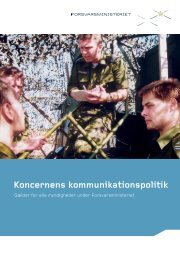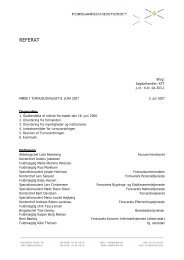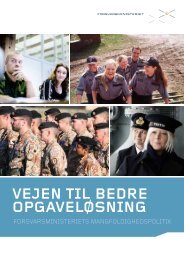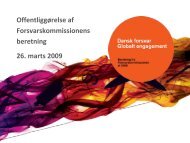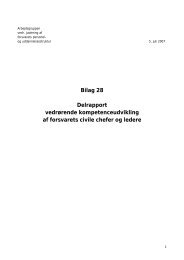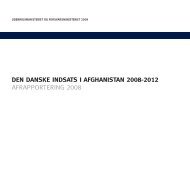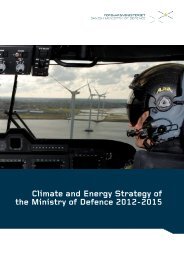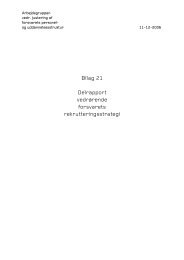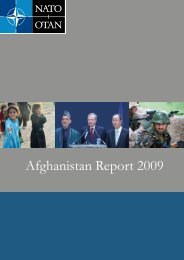the danish veterans' policy
the danish veterans' policy
the danish veterans' policy
- No tags were found...
You also want an ePaper? Increase the reach of your titles
YUMPU automatically turns print PDFs into web optimized ePapers that Google loves.
Many veterans experience that <strong>the</strong>y get a better knowledgeof <strong>the</strong>mselves through <strong>the</strong>ir deployment. Theencounter with a local population with o<strong>the</strong>r culturalstandards in an area of conflict, and with radicallydifferent problems from those in Denmark, has givennew knowledge to many deployed soldiers.Recognition is thus also to realize and appreciate <strong>the</strong>professional and personal competences that <strong>the</strong> veteransacquire during <strong>the</strong>ir deployment.The time before deployment is characterized by intensiveeducation and training in order to prepare <strong>the</strong> soldier forthat specific mission. During deployment, everyday lifemay be characterized by a lot of waiting time and routinetasks, interrupted by intense periods of straining andunaccustomed situations. In most conflict areas <strong>the</strong>re willbe different dangers, depending on <strong>the</strong> specific situation.Improvised explosive devices and combat are examplesof specific threats against <strong>the</strong> life of <strong>the</strong> individual soldier.Destitution in <strong>the</strong> local population, assault on civilians,and injured and deceased colleagues are o<strong>the</strong>r examplesof experiences that deployed soldiers must be able torelate to specifically. The many foreign influences andstraining situations affect most people both physicallyand psychically. Those are normal reactions to unusualexperiences.The tasks in <strong>the</strong> mission areas are very complex anddemand that a soldier has a high mental readiness.For instance, Danish soldiers must be able to not onlyfight rebel forces, protect <strong>the</strong> local population and takepart in stabilizing an area. They must also be able to enterinto a dynamic teamwork with <strong>the</strong> actors responsible for<strong>the</strong> civilian reconstruction and development effort, andwith <strong>the</strong> local population.After deployment, <strong>the</strong> veteran once again has to adaptto Danish everyday life. The veteran’s mental preparednessmust be brought back to <strong>the</strong> same level, as it wasbefore <strong>the</strong> deployment. This can be difficult after a periodof time where high intensity has been <strong>the</strong> norm. Someveterans also display altered physiological reactions.After a longer deployment period of high preparedness,<strong>the</strong> adrenaline production may be increased, amongo<strong>the</strong>r reactions. It is quite normal that it will take time toget it back to <strong>the</strong> level where it was before deployment.This is what we do today:From ‘Battlemind’ to ‘Homemind’Units that have been in Afghanistan are kepttoge<strong>the</strong>r for up to three months after homecoming.The veterans have <strong>the</strong> opportunityto process <strong>the</strong>ir experience toge<strong>the</strong>r, and toget used to <strong>the</strong> transition to civilian life (firstprogramme was in 2008).10The veterans’ <strong>policy</strong> of <strong>the</strong> Danish government



